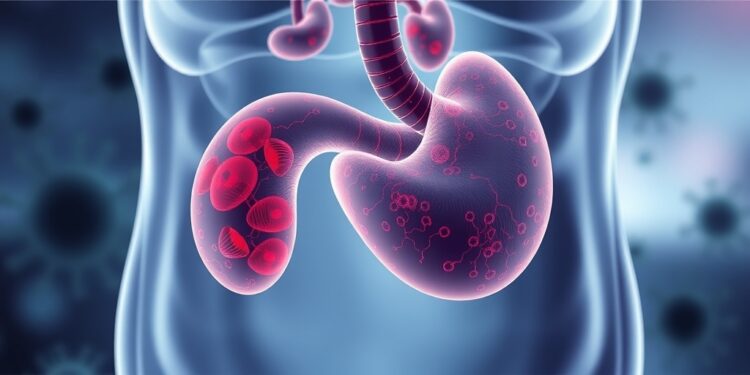
The diagnostic utility of primary biliary cholangitis (PBC)-specific antibodies in patients presenting with elevated alkaline phosphatase (ALP) and gamma-glutamyl transferase (GGT) levels presents a complex dilemma in clinical hepatology. While PBC is characterized by autoimmune destruction of the bile ducts leading to cholestasis, the implications of antibody positivity in individuals with non-PBC conditions remain uncertain. This uncertainty often complicates the diagnosis and management of patients who show similar biochemical profiles due to various underlying causes, demanding a closer examination of the relationship between these antibodies and liver biochemistry.
In a groundbreaking study, researchers set out to clarify this relationship by investigating the effects of etiological treatments in patients who test positive for PBC-specific antibodies but possess elevated ALP or GGT levels attributable to reasons other than PBC. This unique approach aimed to discern whether such treatments could induce improvements in liver biochemical parameters, thereby offering differentiation from true PBC cases. The cohort comprised patients who demonstrated these biochemical anomalies alongside established etiologies, providing a more intricate perspective on cholestatic liver disorders.
The study enrolled a total of 155 patients who met the criteria for PBC-specific antibody positivity combined with elevated ALP and/or GGT levels, explicitly linked to non-PBC diseases. Out of these patients, 100 received a diagnosis of non-PBC liver diseases, predominantly pertaining to metabolic-associated fatty liver disease, drug-induced liver injury, and autoimmune hepatitis. The remaining 55 patients were identified as having non-liver diseases, mostly involving connective tissue disorders. This diverse patient population allowed researchers to assess the impact of various non-ursodeoxycholic acid etiological treatments across different contexts, extending beyond traditional PBC management strategies.
The follow-up period lasted a median of 15.9 months, within which significant clinical outcomes were recorded. Among the 141 patients who adhered to the treatment protocol until the follow-up, an impressive 85.1% exhibited amelioration in their ALP and/or GGT levels. Notably, 51.8% of these individuals achieved complete normalization of both ALP and GGT, shedding light on the potential reversibility of cholestatic biochemistry in patients who otherwise may have been mistakenly categorized based solely on antibody positivity.
However, the findings were not uniformly optimistic. A subset of 68 patients continued to exhibit elevated ALP and/or GGT levels post-treatment, revealing that some individuals had isolated GGT elevations, while others presented with liver histological alterations inconsistent with PBC. This underscores the complexity of diagnosing and treating patients when faced with overlapping biochemical profiles and the potential for misclassification that could lead to inadequate treatment strategies.
The implications of this research are profound. The study definitively indicates that the presence of PBC-specific antibodies does not exclusively denote PBC, as these antibodies can arise in various non-PBC related conditions. Consequently, clinical practitioners are urged to consider initiating specific etiological treatment paths for patients exhibiting ALP and GGT elevations in conjunction with antibody positivity, rather than defaulting to immediate ursodeoxycholic acid administration. This approach prioritizes targeted therapy based on the underlying cause of liver dysfunction, potentially improving patient outcomes significantly.
In aligning therapeutic strategies with individual patient pathology, healthcare providers may not only enhance liver biochemical profiles but also sidestep the limitations associated with administering broad-spectrum treatments for conditions where etiology-specific interventions may yield superior results. The research not only emphasizes the need for precise diagnostic methodologies but also promotes a more personalized approach to liver disease management within the context of increasingly nuanced clinical presentations.
This study has broader ramifications for the understanding of autoimmune diseases and their presentations beyond conventional paradigms. As the medical community continues to unravel the intricacies associated with conditions like primary biliary cholangitis, it becomes increasingly apparent that clinical vigilance and tailored therapeutic regimens are paramount in addressing the challenges posed by these multifaceted disorders effectively. Further studies are warranted to explore the long-term outcomes associated with different intervention strategies and to refine the diagnostic criteria around PBC-related autoantibody positivity.
The findings are published in the esteemed Journal of Clinical and Translational Hepatology, a platform recognized for fostering high-quality peer-reviewed research that speaks to contemporary challenges in liver diseases. As the field of hepatology continues to evolve, awareness and integration of findings such as these into clinical practice will fortify the bridge between research and tangible patient care solutions, ultimately leading to enhanced management and improved health outcomes for individuals grappling with liver disorders.
Future research avenues may delve deeper into the immunological aspects of PBC-specific antibody production and dynamics in autoimmune and metabolic liver diseases, potentially discovering novel therapeutic targets or treatment synergies. The ongoing commitment to unraveling the complexities of liver diseases represents a crucial element in advancing clinical practice and optimizing patient care paradigms.
In conclusion, the study posits that the clinical landscape surrounding PBC and its diagnostic markers can no longer be viewed through a restrictive lens. The evidence has emerged that calls for a paradigm shift—a necessity for clinicians to adopt a holistic approach when evaluating laboratory results and considering treatment options for patients with elevated liver enzymes. Ultimately, such progressive ideas are key to evolving medical practice beyond traditional boundaries in hepatology.
Subject of Research: The diagnostic value and treatment outcomes of PBC-specific antibodies in patients with elevated liver enzymes attributable to non-PBC conditions.
Article Title: Patients with AMA/anti-sp100/anti-gp210 Positivity and Cholestasis Can Manifest Conditions Beyond Primary Biliary Cholangitis
News Publication Date: 17-Jan-2025
Web References: https://www.xiahepublishing.com/journal/jcth
References: DOI: http://dx.doi.org/10.14218/JCTH.2024.00374
Image Credits: Not applicable
Keywords: Primary biliary cholangitis, Autoantibodies, Liver disease, Cholestasis, Liver biochemistry, Etiological treatment, Hepatology, Biochemical normalization, Autoimmune hepatitis, Connective tissue diseases, Metabolic-associated fatty liver disease, Drug-induced liver injury.
Tags: and they should be comma-separated. Firstanti-gp210) might have conditions other than Primary Biliary Cholangitis (PBC). The content discusses how PBC-specific antibodies are present in non-PBC casesanti-sp100I need to understand the main points of the article. The title mentions that cholestatic patients with certain antibodies (AMAlet’s tackle this task. The user wants 12 appropriate tags for the provided articleOkaythe study





